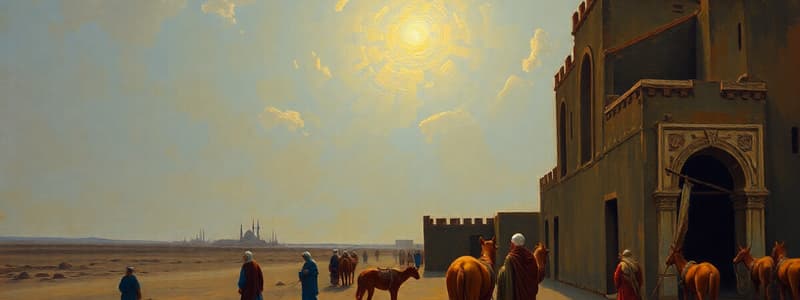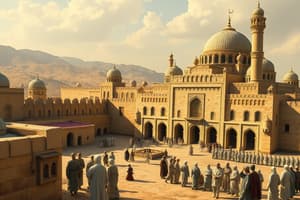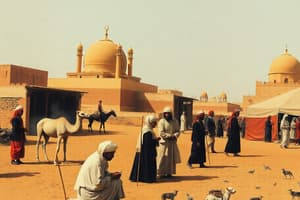Podcast
Questions and Answers
What role did the Bedouins play in the early Islamic armies?
What role did the Bedouins play in the early Islamic armies?
- They were central to the armies due to their warrior skills. (correct)
- They provided resources like spices and incense.
- They were primarily traders along major trade routes.
- They were responsible for religious teachings in communities.
Which city served as a religious center for the followers of Muhammad?
Which city served as a religious center for the followers of Muhammad?
- Palmyra
- Petra
- Mecca (correct)
- Damascus
What significant event prompted Muhammad to become a prophet?
What significant event prompted Muhammad to become a prophet?
- A vision from the angel Michael.
- The establishment of trade routes in Arabia.
- Hearing the voice of the angel Gabriel during prayer. (correct)
- His interactions with Christian and Jewish communities.
How did the Bedouin clans contribute to their society?
How did the Bedouin clans contribute to their society?
Which of the following products was not commonly traded along Arabian trade routes?
Which of the following products was not commonly traded along Arabian trade routes?
What was one of the main factors that helped hold the Muslim Empire together?
What was one of the main factors that helped hold the Muslim Empire together?
Which class in Muslim society had the privilege of lower taxes?
Which class in Muslim society had the privilege of lower taxes?
What was a significant threat to the unity of the Muslim Empire?
What was a significant threat to the unity of the Muslim Empire?
Which of the following fields saw significant advances during the time of the Muslim Empire?
Which of the following fields saw significant advances during the time of the Muslim Empire?
What role did women have in Muslim society during the Abbasid caliphate?
What role did women have in Muslim society during the Abbasid caliphate?
What event caused Muhammad and his followers to leave Mecca?
What event caused Muhammad and his followers to leave Mecca?
What was the original name of the city that was renamed Medina?
What was the original name of the city that was renamed Medina?
Which of the following is NOT one of the Five Pillars of Islam?
Which of the following is NOT one of the Five Pillars of Islam?
What connects Judaism, Christianity, and Islam regarding their belief system?
What connects Judaism, Christianity, and Islam regarding their belief system?
Which of the following statements about Muhammad's successors is true?
Which of the following statements about Muhammad's successors is true?
What is one reason the Abbasids were significant to the Islamic empire?
What is one reason the Abbasids were significant to the Islamic empire?
How did Muslims manage to control areas across three continents?
How did Muslims manage to control areas across three continents?
What do Muslims believe regarding Muhammad in the context of prophets?
What do Muslims believe regarding Muhammad in the context of prophets?
Flashcards
Arabian Peninsula Location
Arabian Peninsula Location
A crossroads of Africa, Europe, and Asia, primarily desert with some fertile areas and oases.
Bedouin Culture
Bedouin Culture
Nomadic herders in the desert, organized into tribes for security, valuing courage, loyalty, and warrior skills.
Mecca's Importance
Mecca's Importance
A religious and trade center in Arabia, attracting pilgrims visiting the Ka'aba.
Monotheism in Arabia
Monotheism in Arabia
Signup and view all the flashcards
Muhammad's Role
Muhammad's Role
Signup and view all the flashcards
Hijrah
Hijrah
Signup and view all the flashcards
Five Pillars
Five Pillars
Signup and view all the flashcards
Monotheism
Monotheism
Signup and view all the flashcards
Islam's spread
Islam's spread
Signup and view all the flashcards
Mecca
Mecca
Signup and view all the flashcards
Medina
Medina
Signup and view all the flashcards
Muhammad
Muhammad
Signup and view all the flashcards
Qur'an
Qur'an
Signup and view all the flashcards
Factors that held the Muslim Empire together
Factors that held the Muslim Empire together
Signup and view all the flashcards
Factors that threatened to break up the Muslim Empire
Factors that threatened to break up the Muslim Empire
Signup and view all the flashcards
Muslim Society Classes
Muslim Society Classes
Signup and view all the flashcards
Women in Muslim Society
Women in Muslim Society
Signup and view all the flashcards
Muslim Advances in Science and the Arts
Muslim Advances in Science and the Arts
Signup and view all the flashcards
Study Notes
The Muslim World (600-1250)
- The Arabian Peninsula was a crossroads of three continents: Africa, Europe, and Asia.
- It had a small fertile area in the south with oases, otherwise it was desert.
- The Bedouins were nomadic herders who lived in the desert.
- They were organized into tribes and clans, providing security and support.
- They were proud of their adaptability to the desert and their ability to defend themselves.
- Some Bedouins later settled down as farmers or town dwellers.
- Bedouin ideals included courage, loyalty to family, and warrior skills.
- These ideals influenced the Islamic way of life.
- Trade routes connected Arabia to major oceans and land routes.
- Traded products included spices, incense, information, and ideas.
- Major cities like Petra, Palmyra, and Mecca were important trade centers.
- Mecca was also a religious center, a pilgrimage site, and a trade hub.
Monotheism
- The belief in one God is central to Islam.
- Many Christians and Jews (known as Hanifs) lived in Arab lands and practiced monotheism.
The Rise of Islam
- Muhammad was born into a mixed religious environment in Mecca.
- He became a trader.
- At age 40, while in prayer, Muhammad heard the voice of the angel Gabriel.
- Gabriel told Muhammad he would be a messenger of God.
- In Mecca, Muhammad gained converts by teaching that Allah is the one and only God, and Muhammad is his last prophet.
- Many Bedouin tribes converted to Islam.
The Hijrah
- Some people in Mecca feared that the city would lose its pilgrimage importance due to Muhammad's monotheistic teachings.
- Facing hostility, Muhammad and his followers left Mecca and settled in Yathrib.
- Yathrib later became known as Medina (the city of the Prophet).
Muhammad Unified Arabia Under Islam
- Muhammad and his growing army of Bedouin followers took control of Mecca.
- They unified much of Arabia under Islam.
Beliefs of Islam
- There is only one God, Allah.
- There is good and evil, and each individual is responsible for their actions.
- Muhammad is the messenger of Allah.
- All believers must carry out the Five Pillars of Islam.
The Five Pillars
- Faith
- Prayer
- Alms
- Fasting
- Pilgrimage (Hajj) to Mecca
Similarities and Differences between Jews, Christians, and Muslims
- All three religions believe in one God (monotheism).
- They all believe Abraham was a prophet.
- Jews and Christians believe in the Old Testament and the Ten Commandments.
- Jews and Muslims believe Jesus was a prophet.
- Muslims believe that Muhammad is the final prophet.
- Muslims believe in the Quran as the final word of God.
- Jews believe they are still waiting for the Messiah.
- Christians believe Jesus is the son of God and the Messiah and believe in the New Testament.
Muslim Achievements During the Abbasid Caliphate
- Muslim society during the Abbasid caliphate was divided into four classes.
- Upper class Muslims from birth were taxed less than others.
- Converts were taxed higher than upper-class Muslims.
- "Protected peoples" (e.g., Christians, Jews) were taxed higher than others.
- Slaves, mostly prisoners of war, were at the bottom.
- Women had a limited but vital role in Muslim society, with more rights compared to European women of the time.
- Muslim leaders supported scholarship, and Muslims preserved knowledge.
- Achievements in science include advances in medicine, mathematics, and astronomy.
- Contributions to philosophy, literature, and architecture should also be recognized.
The Spread of Islam
- Muhammad's successors defended and expanded Islam.
- Many conquered people chose to convert to Islam.
- Conquests were sometimes enforced (convert or die).
- Muslim lands were split among rival groups.
- The Abbasids took power and ruled for 500 years.
- Independent Muslim states emerged.
- Local leaders gained dominance in smaller regions.
- A vast trading network extended across the empire and further across various regions, including China and below the Sahara.
Factors that Helped Hold the Muslim Empire Together
- Religion
- Language
- Trade
- The economy
Factors that Threatened to Break Up the Muslim Empire
- Rise of independent Muslim states
- Dominance of smaller regions by local leaders
Cause and Effect of Islamic Expansion
- Causes: Religious zeal, overpopulation, desire for new lands and wealth, weakness of neighboring empires (Byzantine and Persian).
- Effects: Arabic became the common language, Islamic civilization spread, preservation of knowledge, Arab control of trade routes, split between Shi'ite and Sunni Muslims.
The Spread of Islam Map
- The map shows territory controlled by the Muslim Empire under Muhammad in 632, and further expansions by subsequent leaders.
Muslim Achievements
- Important advancements in medicine, mathematics, astronomy, and philosophy occurred.
- They preserved much lost knowledge and expanded the sciences.
Studying That Suits You
Use AI to generate personalized quizzes and flashcards to suit your learning preferences.




